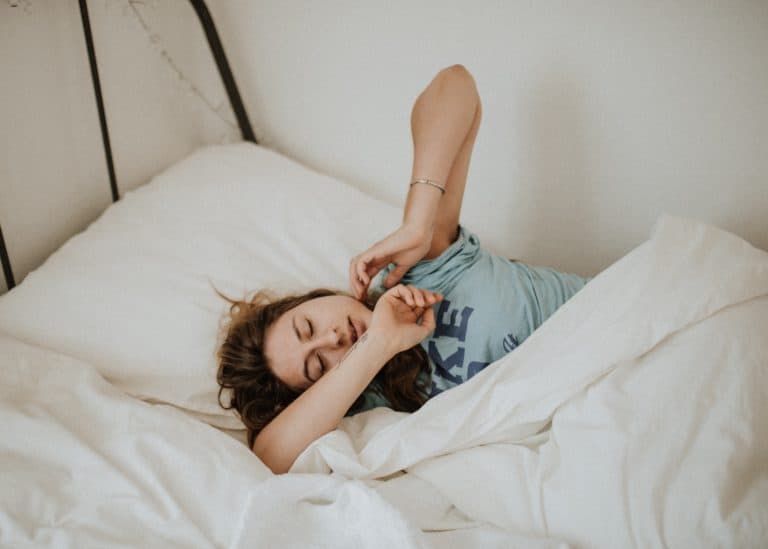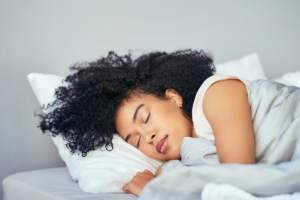Implementing the sleep hygiene hints that seek enhancement of one’s sleeping ability and schedule usually begins by Students trying to improve their sleep routines. They are simple to apply and can help you feel absolutely amazing!

A nice bedroom should be a tranquil and relaxing place.
-
Adjust the Temperature
Diets, exercise habits, and stress can all affect how well a person sleeps. What most do not know, however, is that their environment may also have a very significant impact on their sleep; in fact, controlling the temperatures in bedrooms is crucial to whether a person sleeps well or poorly.
Each person’s body has a usual temperature cycle throughout the day and night, and at night that temperature has to drop several degrees so that a good sleep cycle may be experienced, many people however do not fall asleep in this ‘sleep zone’ because their bedrooms are too warm or too cold for them to get a restful night’s sleep.
Before going to bed, think about turning your thermostat down and making some other changes in your room. If you the heat during your sleep, consider getting light cotton or bamboo sheets as they are “naturally lighter and more breathable”. In addition, if the heat is extreme in the summer, layering on the flannels might be an option. Ideally, there should be no TV watching, late night internet browsing or idle late night chats in your bed as this might through your brain in a conflict of interests. This way we condition our brain to link our bed and sleeping together respectively.
-
Generate a Tranquil Atmosphere
When you start turning and tossing for more than an hour or even wake up around 2 am, it could be an indicator that your bedroom is not the place suitable for you to sleep peacefully. However, dealing with such issues does not always seem impossible as one way of solving them is making certain basic changes but ultimately, it may involve doing some much more complex alterations. That would involve figuring out levels of light, noise and temperature that are ideal for sleeping in your room.
Even the lightest sound can be enough to disrupt a good night’s sleep regardless of whether you sleep in a busy street or share an apartment with a condom snoring habitually. Sound off the earplugs, or apply white noise. The latter is enjoyed by the crickets, pixies, and the extremely rich. An app or machine can be used to drown out any unwanted sounds, allowing for the use of raindrops or a softly blowing wind to be blanketed over the ears. The bushes aka the clouds are even suggested by scientific research.
Chill out in the hour leading up to bed; read a book in low light, take a warm bath, meditate or anything else that might be relaxing. It’s all about brain education; follow through with those activities regularly enough and it will trigger your mind to know it’s time to sleep. Avoid any sudden stimulation or nerve-wracking tasks an hour or two before bedtime, and make these final hours soothing.
-
Limit Caffeine
Caffeine-free people always seem to be in great shape thanks to the untiring support of their internal body clock, and the remainio and sulforaphane pack. They are a huge reason why it’s recommended to stay caffeine free or abstain from caffeinated drinks six hours before sleep, which helps add an extra layer to the mix.
Similar to different ideas, one can also consider adjusting his routine of eating dinner early and decreasing time spent in bed that involves tv and/or browsing on a computer, as such practices interfere with the patients’ cognitive functions and therefore lead to poor sleep patterns. Moreover, try engaging in routine workouts so as to release the vigorous energy from your body and reduce the anxiety as well; the only condition is that any exercise routine must be done in such times that it does not affect the$ sleeping pattern of the person. Give caution to performing exercise during late hours, as it is likely to stress you out more thereby affecting your pattern of sleep negatively. People are advised to reduce their alcohol intake as that too impacts the sleeping patterns in quite a negative manner.
-
Shut the Window Curtain
Darkness guarantees a perfect condition for the secretion of melatonin and also contributes in modulating the environment needed for sleep. Assuming the lights in your room cannot be completely turned off during sleep, try to turn off other electronics and other forms of gadgets at least several minutes before sleep, with the help of low-illuminance night lights, especially red, use them in rooms to serve as a substitute during the night. If one of your family members almost forcely wants to turn on the light, or if you are sensitive to darkness, you may want to put up some nightlights that turn on automatically when it is dark and produce little light, so you won’t fall in the dark while walking.
With the increasing pace and movement of the world, sleep is often compromised leading to poor sleep quality. To avoid this, there is a concept known as sleep hygiene that encompasses all the processes involved in getting quality sleep. These include limiting usage of electronics at night, having a peaceful sleep routine and ensuring exposure to sunlight during the day. Also, conversely, one can also read some books or listen to calm and relaxing music in order to prepare oneself for sleep.
-
Avoid Excessive Screen Time
The presence of smartphones and tablets has made human lives easier, however, what comes at a cost is poor sleep. This is mainly because looking at these devices produces blue light that hinders the production of melatonin – a sleep inducing hormone, thus leading to an increase in pangs of insomnia.
Completing cutting electronics out of your life is impossible, in that scenario it is necessary to atleast take out a few minutes to relax off the devices and engage doing stress relieving activities such as taking a warm bath. Excessive internet surfing should also be avoided as it raises your stress levels leading to even more difficulty in sleeping.
Tell your family to do outdoor activities, play board games or even do some hobby-related activity together that does not involve a screen. Such experiences can help balance the relationship between technology and people and make them engage more in family-making activities. What’s more, apps or dark mode features on devices may help with reducing blue light exposure around bedtime making it easier to sleep.



